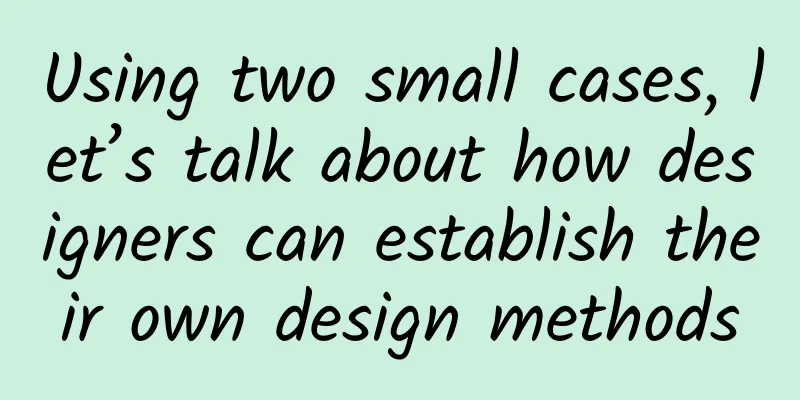Using two small cases, let’s talk about how designers can establish their own design methods

|
Before submitting resumes, when analyzing JDs, we often see a job requirement that says: "Have design methods to support design implementation." During interviews, interviewers often ask, "What methods have you accumulated in your daily design work?" After joining the company, during promotion defense, the design committee mentor will also ask: The accumulation of design methods in work. Design methods are a work ability that the team values very much and are also an important consideration for the candidate's job grade. The topic of "design method" is a concept that is repeatedly mentioned in JDs, interviews, defense and promotion, and even design reviews, which shows its importance.
I admit that many design partners dislike design methods. There are a lot of concepts in front of them, and the designs they produce don’t seem that reliable. They are abstractly described by everyone as: working like a tiger, but the results are 1-5. In fact, design methods not only ensure the standardization and rigor of our design, but are also an important indicator for considering whether designers are capable of independently responsible for design business. After all, in business goals, each link has the ability to determine the final effect of the project. As the designer in the "design" link of project development, the design method at least determines the rigor of our design, and will not have a negative impact on the project effect because of the design (after all, design is beautiful, who doesn’t like beautiful things). Next, this article will analyze how designers create their own design methods. First, we need to break down the concept. Design method is a combination of the two words "design" and "method". Baidu Encyclopedia explains "method" as follows: Method: The means and behavior taken to obtain something or achieve a certain goal. Next, let’s look at the design concept. Design: refers to the designer's technical creation and creative activities carried out in a targeted and planned manner. First, a project is planned, and then the whole process of conceiving, formulating plans, implementing operations, drawing drawings, carrying out construction, testing samples, and passing the acceptance of the design plan is carried out according to the requirements of the plan. In short, design is a process of conception, planning, planning, and budgeting. Let's combine the concepts of design and method: conception, strategy, means of execution, actions and means taken to complete a project. Combined with our experience design, it can finally be defined as: specific design actions taken to achieve a business goal. With this simple definition, let's break it down: if a project has a new product that needs to define a theme color, the process of reasoning and extracting the theme color through specific means such as mood boards and 360° color wheel rules is a kind of "design method". I believe that most companies’ design teams have their own design methods and processes, which ensure the quality of product design output. For us designers, we also need to have our own design methods to help us grow further professionally. Our designers’ daily work is to meet various needs. We don’t have time to think about and settle design methods. Or some needs are time-sensitive. Some design behaviors are just impulsive. We think it’s a good idea to do so and then execute the design. In fact, each of our designers has his or her own design method. I call these design methods “points”. These points are scattered in various places in the brain and have never been “connected in series”. When the “points” scattered in the brain are connected, they form a “net”. The “points” connected by this “net” are our design methods. Looking back at the designs we have done with this “net”, we will find that the depth and angle of thinking will change. In the long run, we will not only exist as “design resources”, but we will participate in product construction through our design capabilities. I believe that in the early stage of your career, because you don’t have much work experience, we all participate in the project as a "design resource". After getting the PRD and prototype, we conscientiously complete our design work. However, due to the complexity of business requirements, PRD and prototype are not so rigorous, which may lead to some problems with this requirement. When we carefully complete the design according to PRD, there are always some logical problems and imperfect status in the design review stage. After all, the front-end development engineers develop according to our design drafts, so these problems may be identified as design problems, so the designers enter a state of modification and modification, and quarrel with the product, and eventually they are reduced to "design resources" in the project. We designers have been led by the demand side, constantly doing and changing, and finally exhausted physically and mentally, and failed to participate in the project. In order to solve this problem, we need to establish our own design method. In order to get myself more involved in the project, here are some of the ways I connect with the needs on a daily basis.
Looking at the above four steps as a whole, we can find that the fourth step is the stage of design execution. Steps 1-3 are all design thinking. Through thinking, business logic problems are exposed first to avoid problems being exposed after the design is completed; then the design execution begins. After execution, the design is extracted, and the common and repetitive design work is extracted, summarized, and reused to reduce the design workload. To sum up, the above process of matching needs, thinking about business, and designing execution is our design method. Through this method, we actively participate in the product logic, transforming from passively accepting needs to jointly building product needs. While improving our design capabilities, we also improve our ability to think about the business. After working for a long time, we will take on bigger and more important business, which requires us to have stronger inductive ability and driving force. Therefore, business needs not only require us to control a demand, but also require us to control the design of a business line demand. I am now responsible for the control of the entire B-side App demand in the company. Faced with this complex business line, I need to spend a lot of time to calm down and study the business and explore the purpose behind the demand. In this article, we take the "search" entrance as an example to disassemble the search design method. Since we need to meet the demand of "search", we must first understand what problems the emergence of search solves. Is it okay without search? Since search has emerged, what are the business logics of "before, during, and after" search? What problems does search solve in the business? Search is a very common function, and now almost all digital products have search. Search is a shortcut for users to skip complex processes and get the information they want directly, just like teleportation within an application. However, search is only one way we solve user problems at present, not the way we will eventually solve the problems users want, because the world is changing, and search results must also keep changing. Our search results are only recommended based on the user's search content, which is a question of possibility and probability. As Ben Gomez said: There is no end to the search for the perfect solution to the search problem, because the world is constantly changing. " After understanding the purpose of the search, start to break down the steps of the search. What steps will be taken when a user has a search need?
In the step of obtaining search requests, common methods include text input, voice recognition, QR code scanning, image recognition, etc. These search request methods have different characteristics, which require us to disassemble them bit by bit, and then make different design plans according to different cases. … In the search business, we consider not only the design method of a project, but also the design ideas and methods of the search business line. Different perspectives on problems give us different understandings of the business. In the search business line, we think more about how to help users solve problems and the value of the search business from a global perspective. From the above two cases, you should be able to find that the design method is not a fixed concept or a dogmatic method, but a specific method to solve business problems based on the specific business and one's own situation. So what are the characteristics of the design method?
Finally, there is no fixed process for design methods. Everyone has their own way of solving problems, so how do you find a design method? I would like to share some of my little experiences with you.
|
<<: WeChat iOS 8.0.9 official version released: known issues resolved
Recommend
Project release and deployment
Pre-publishing setup Since the new version of ASP...
Look at the product growth of WeChat Reading through the AARRR growth model!
As we enter the second half of the mobile Interne...
Marketing trends for 2022!
With the development of big data, artificial inte...
How to plan an anniversary event? Teach you step by step
This article is a homework assignment, which is t...
I stood at the wrong door! Why do subway doors always change the direction they open?
Audit expert: Hu Qizhou, Associate Professor, Sch...
Why do you always choose the slowest one in the queue? You may have stepped on the hidden "Law of Bad Luck"
Have you ever had this experience: you see the te...
QQ has also launched AR red envelopes. How is it different from Alipay?
The Year of the Rooster is approaching, and red e...
A heart-breaking suggestion for advertising purchased with a 1 million yuan budget!
People often ask me, which channel is the most ef...
Don’t be fooled by its cute and sloppy appearance, it is actually the domineering “Elvis”!
The Shanghai Zoo recently completed the artificia...
Case analysis: Explosive growth of operational activities!
User Growth (UG for short), like the concept of “...
Science in the spotlight this week | Desert lakes seen from space
1. Desert lakes seen from space Recently, my coun...
How do beauty brands achieve from 0 to 1?
In recent years, the domestic beauty and skin car...
Low traffic? Try these 6 low-cost marketing tactics!
Growth is a proposition that almost every operato...
Two contradictory viewpoints in the same research field won the Nobel Prize in Physiology at the same time
The Nobel Prize ceremony in 1906 was a lively and...









